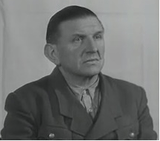Georg Lörner
Georg Nikolaus Lörner (18 February 1899 Munich – 21 April 1959 Rastatt) was a German SS functionary during the Nazi era. He served as Deputy Chief under Oswald Pohl, of the SS Main Economic and Administrative Office.
Georg Lörner | |
|---|---|
 Georg Lörner at the Nuremberg Trials | |
| Born | 18 February 1899 München |
| Died | 21 April 1959 (aged 60) Rastatt |
| Allegiance | |
| Service/ | |
| Rank | SS-Gruppenführer |
Concentration camps
The SS Main Economic and Administrative Office (WVHA) was set up to manage the quartermaster and paymaster duties of the SS, including originally the Waffen-SS, as well as handling the various financial enterprises of the Allgemeine-SS, and the concentration camps.[1]
Amtsgruppe B, was responsible for the supply of food and clothing for concentration camp inmates, and for supplying food, uniforms, equipment and camp quarters for the concentration camp guards of the SS-Totenkopfverbände.
Oswald Pohl was chief of Amtsgruppe W and Lörner was his deputy. Amt W was responsible for the operation and maintenance of various industrial, manufacturing, and service enterprises throughout Germany and the occupied countries, as well as providing clothing for concentration camp inmates.
Trial
Loerner was a defendant along with his brother Hans Lörner (b. 1893, Office 1, Office Group A) in U.S.A. v. Pohl et al. He was found guilty on counts 2 (war crimes), 3 (crimes against humanity), 4 (membership in a criminal organization), and was given the death penalty which was reduced to life in prison then commuted to 15 years. He was released from Landsberg prison on 31 March 1954; his brother received ten years and was released in 1951.[2]
References
- Ernst Klee, Willi Dressen and Volke Riess (editors), "Those Were the Days": The Holocaust Through the Eyes of the Perpetrators and Bystanders, London, Hamish Hamilton, 1991; published in the USA under the title "The Good Old Days": The Holocaust as Seen by Its Perpetrators and Bystanders, Old Saybrook, CT, Konecky and Konecky, 1991 ISBN 1-56852-133-2
- U.S.A. v. Pohl et al. Archived 2010-07-09 at the Wayback Machine